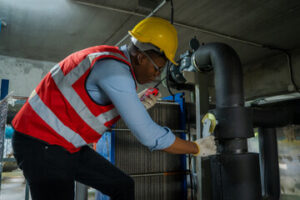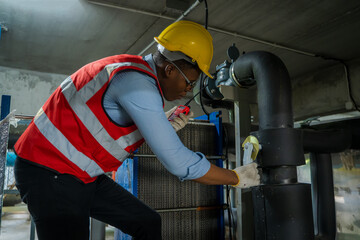There are many scenarios where you may need to call an emergency plumber. Some are obvious such as when water is flowing from the ceiling or if you have a flooded basement. Other emergencies, such as having no access to clean water, might be less apparent, which is an issue if you need to wash dishes, take showers, and tend to your garden or lawn.
 A sewage backup is one of the worst situations you can face as a homeowner. The smell is horrific, and the water can ruin floors, walls, and belongings. It’s a serious health hazard and can result in costly and extensive home damage.
A sewage backup is one of the worst situations you can face as a homeowner. The smell is horrific, and the water can ruin floors, walls, and belongings. It’s a serious health hazard and can result in costly and extensive home damage.
If you suspect a sewer backup, turn off your water supply and contact a plumber as soon as possible. The first thing they will do is shut off the flow of wastewater. This suspends the momentum, lessens the volume that ends up in your home, and containment is much easier.
You should also turn off the electricity. The last thing you want is an electrical shock while you’re dealing with sewage. If you have children, keep them away from the mess, and be sure to use face masks, rubber gloves and eye protection when working in the area. It’s also a good idea to inform your insurance company of the situation as soon as possible. They can help you determine if the sewage is covered under your policy.
Many factors can cause a sewer backup. The most common is a blockage caused by the combination of toilet paper, hair, soap scum and grease that gets flushed down drains. This is often due to a poor plumbing design, and it can be fixed by a professional plumber.
Another cause is tree roots. Over time, the roots can penetrate cracks in a sewer line and cause it to clog. The best way to protect against this is to have your sewer lines inspected on an annual basis and clean them out every few years. It’s also a good idea not to flush anything other than human waste and toilet paper down the drains. Other common causes include heavy rain and old pipes.
Some things are out of a plumber’s control. If the sewer backs up because of a city problem, the plumber may not be able to fix it until the problem is resolved by the municipality. It’s always a good idea to check the condition of your pipes before heavy rainstorms and to have them cleaned on an annual basis. This can prevent small problems from turning into emergency situations.
Many homeowners have experienced a clogged drain at one time or another. It’s a frustrating and inconvenient situation that can be caused by a variety of things, including food waste, hair, soap scum, grease, toilet paper, and more. Often, a clogged drain will cause water or sewage to back up into your home’s plumbing fixtures and can be very difficult to fix without the help of an emergency plumber.
There are a few ways to find out if you have a clogged drain, but the most obvious sign is when your sinks, bathtubs, or showers start to drain slowly or not at all. In addition, if you notice foul odors coming from your drains or plumbing fixtures, this is another surefire sign that there’s a serious problem with your home’s drainage system.
If you have a single clogged drain, it may be easy for you to address with the help of household tools like a plunger or drain snake. However, if you have multiple clogged drains in your house, this is likely a sign of a major issue with your home’s sewer or water line and will require the services of an emergency plumber to resolve.
Most drain clogs occur because of the buildup of waste in your pipes over time. Grease, food scraps, hair, and soap scum can stick to the walls of your pipe and lead to blockages. Other causes of clogged drains include tree roots, broken or cracked pipes, and improper home maintenance.
The sewer and water lines in a house are configured a little bit like a tree with its branches. There’s usually a main line that’s the largest in diameter, and then sublines branch off of it that are smaller in size. While clogs are most common in toilets, they can happen anywhere in the house and affect all of your plumbing fixtures.
The best way to avoid drain clogs is to be careful about what you put down your drains. Don’t flush items that don’t belong in the toilet, like diapers, sanitary products, or paper towels. Also, make sure to have a water softener installed in your home if you have hard water, as this can prevent the formation of minerals that can block your pipes and lead to clogs.
Water leaks can quickly become a major problem that causes significant damage and needs to be fixed immediately. Whether it’s a burst pipe, a constant drip or other signs of a water leak, such as damp floors or walls, you should call an emergency plumber right away. Before the plumber arrives, there are some things you can do to help reduce the damage and save money. First, try to locate and shut off the water valve near the leak. You can also turn off the water at your home’s main meter. This will stop all water flow to your house and prevent more flooding from occurring.
Next, try to identify the source of the water leak. You may be able to see the leak, but if not, check behind furniture or in closets for moisture or mold. Finally, take pictures of any damage and be prepared to describe the problem clearly to the plumber. This will help them diagnose and repair the issue more efficiently.
Leaking toilets, faucets and showerheads can be easy to ignore, but if they continue to drip or leak, it’s time to call an emergency plumber. Leaks can cause water damage to your home’s structure and contents, as well as lead to costly water bills. If the leak is caused by a faulty part, it’s best to replace the part rather than trying to fix it yourself with store-bought chemical drain cleaners.
Another sign of a leak is if you notice water stains on your ceiling or walls. If the leaking is coming from a toilet, shower or sink, it can lead to mold and mildew growth, which can be harmful to your health.
Water leaks from washing machine hoses are another common cause of home flooding and insurance claims. These leaks can be easily repaired if caught early, but if ignored they can cause flooding and serious water damage. Look for dripping or pooling water under your washing machine, and listen for loud squeaking or hissing when it’s in use. If the hose is disconnected from the plumbing system, it can lead to flooding and expensive repairs.
A burst pipe is a common plumbing emergency that needs to be addressed immediately. It can cause serious water damage and even mold in your home if left untreated. In order to minimize the damage, you should call an emergency plumber right away and turn off your home’s main water supply until they arrive. You should also remove any valuables and move to higher ground if possible. Once the plumber arrives, they will be able to fix the broken pipe and restore your home.
A clogged toilet or drain is another plumbing issue that can quickly become an emergency if it’s not fixed in a timely manner. If your toilet is backed up and overflowing, it can lead to flooding and water damage in your home. A clogged drain can also be a sign of a more serious problem like a sewer backup, so it’s important to call an emergency plumber right away.
It’s not always clear when you should call an emergency plumber. Generally, if there’s an issue that affects your ability to use your home’s plumbing or it’s causing damage, you should call right away. Emergency plumbers are typically more expensive than standard plumbers, but they can save you money in the long run by addressing issues before they get worse.
You can help prevent emergency situations by learning about the different types of plumbing emergencies and taking proactive measures to avoid them. For example, you should know where the water shut-off valve is located in your home so that you can turn it off in an emergency. You should also take care to schedule regular maintenance services with a professional plumber so that problems don’t arise in the first place. Finally, it’s a good idea to contact multiple plumbers and compare their services and prices before choosing one. This will ensure that you’re getting the best value for your money and are hiring a reputable plumber. You can also check online reviews and testimonials to see what other customers have said about the plumber you’re considering hiring. If you’re looking for an emergency plumber, visit HomeStars to find a reliable provider in your area.

